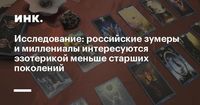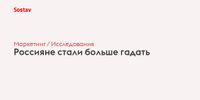A recent study has shed light on a notable trend in Russia: the increasing interest in esotericism, particularly among younger generations, though it appears that older individuals are leading this curiosity.
Conducted by analysts at Platforma, the research found that the audience captivated by mystical practices like tarot reading and astrology surged from 7.3 million in 2023 to 9.5 million in 2024—an impressive 30% increase. This growth in audience demand is particularly pronounced in major Russian cities such as Moscow, Saint Petersburg, Krasnodar, and Nizhny Novgorod, where urban residents are showing a marked enthusiasm for esoteric practices.
But who exactly constitutes this audience? The demographic study indicates that the most active participants in this mystical realm are those aged 35 to 44, making up 33% of the audience. Following closely are those within the 45 to 55 age range at 26%, proving that the interest in astrology and tarot isn't confined to youth alone. Interestingly, the younger generations, known as zoomers and millennials, aged 25 to 34, account for 19% of this growing group. Moreover, the interest appears to have a slight gender skew, with women showing a stronger inclination towards esotericism, comprising 54% of enthusiasts against 46% for men.
Financially, the study reveals that over half of those intrigued by esotericism report having an average income, while a notable 28% identify as individuals with higher earnings. This blend of demographics shows that esotericism appeals to a broad range of socioeconomic backgrounds, indicating a sociocultural phenomenon rather than a niche interest.
The surge in interest aligns with broader patterns observed during periods of political uncertainty, pointing to a potential link between societal instability and a greater desire for mystical guidance. Alejandro Novozhilov, Head of Advertising Service Development at Platforma, noted, “Every year we see how esotericism increasingly penetrates the digital space. The growing demand for online layouts, fortune-telling applications, and high user engagement in astrological forecasts speaks of serious changes in audience behavior.”
The consistency in the popularity of tarot as a practice cannot be overlooked either. In 2023, the demand for tarot readers escalated by 18%, and search statistics indicate that inquiries related to learning about tarot readings exceeded 21,000 on Yandex, demonstrating the keen public interest in developing personal skills in this mystical practice. This fervor continued into 2024, underpinning the ongoing fascination with tarot applications like Velstar and other fortune-telling services.
As the landscape shifts, users are increasingly turning to digital platforms for guidance in their esoteric pursuits. The prevalence of tarot and astrology applications has exploded, helping more individuals navigate the chaos of daily life through mystical means. Many seek stability through insights they believe these practices can provide, especially during unpredictable times.
Such trends often come hand in hand with socio-political factors. The study associates the spikes in interest with notable astrological events—think retrograde Mercury or significant lunar phases—that seem to captivate audiences seeking explanations for their lived experiences. Analysts suggest that the rising popularity of fortune-telling aligns with these astrological phenomena, creating an engaging narrative that appeals to the public's search for reassurance.
Interestingly, government responses to this growing interest reveal a complex intersection of societal attitudes towards esoteric practices. Recently, proposals have emerged in the State Duma to consider legislation aimed at regulating and potentially prohibiting the advertising of esoteric services, including those of spiritual and energetic guides. This suggests that while interest grows, official perspectives may aim toward restrictions amidst concerns over misinformation and consumer protection.
In summary, the increasing interest in esotericism among Russian citizens illustrates a multifaceted response to a dynamic social environment. As curiosity about mystical guidance persists in the hearts of many, the trend towards tarot readings and astrological insights reflects not just a search for meaning amidst uncertainty but also highlights the ongoing digital evolution of such practices, making them more accessible and engaged in daily life. Whether this trend will endure or face impending regulation remains a crucial question for both followers and critics of esoteric practices.






